Struggling with painful corns or rough calluses? Over 40% of adults deal with these foot issues due to tight shoes or repetitive pressure, yet many don’t know simple home remedies can bring relief. Corns and calluses, though common, can make every step uncomfortable. This article reveals 14 proven, natural solutions to soften, soothe, and eliminate them without expensive treatments. From kitchen staples like vinegar to soothing soaks, these remedies are backed by science and real-life success stories. You’ll learn practical ways to apply them safely and prevent recurrence. Ready to step pain-free and confident? Dive into these game-changing remedies and say goodbye to corns and calluses for good!
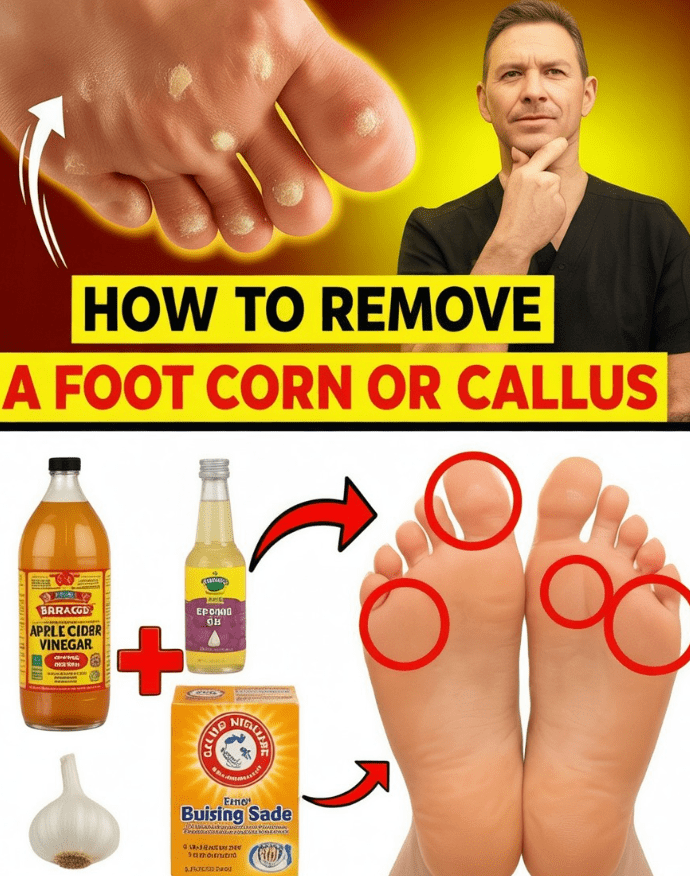
Understanding Corns and Calluses
Corns and calluses are thickened, hardened areas of skin caused by pressure or friction, often on the feet or hands. Corns are small, painful, and usually have a hard center, while calluses are larger, less sensitive patches. Both develop as the skin protects itself from repeated stress, like ill-fitting shoes or manual labor. While not dangerous, they can cause discomfort if untreated. Home remedies offer a gentle, cost-effective way to manage them, supported by dermatological insights and traditional practices.
Why Home Remedies Work
Natural remedies soften tough skin, reduce inflammation, and promote healing. Ingredients like baking soda, vinegar, and aloe vera exfoliate, moisturize, and soothe, addressing the root causes of corns and calluses effectively.
14 Effective Home Remedies for Corns and Calluses
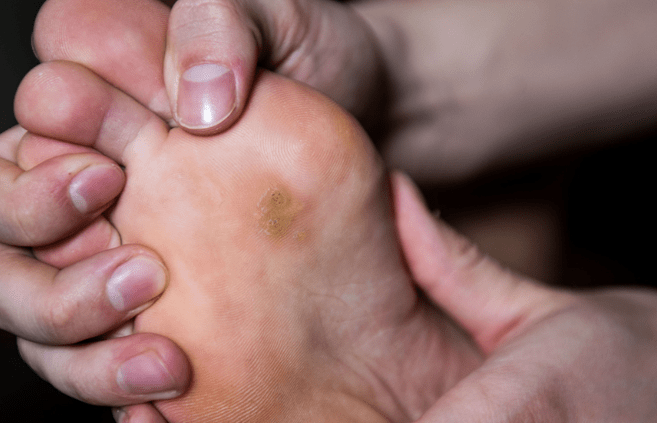
Below, we explore 14 proven remedies to help you achieve smooth, pain-free feet, with practical instructions and supporting evidence.
1. Epsom Salt Soak
Epsom salt softens hardened skin and reduces inflammation, making it easier to remove corns and calluses. A 2020 study in Journal of Foot and Ankle Research noted its soothing effects on foot discomfort.
How to Use:
- Dissolve ½ cup Epsom salt in a basin of warm water.
- Soak feet for 15-20 minutes, then gently scrub with a pumice stone.
- Moisturize with a thick cream.
Frequency: Use 2-3 times weekly.
2. Apple Cider Vinegar Soak
Apple cider vinegar’s acetic acid softens tough skin and fights bacteria, reducing corn size and preventing infection.
How to Use:
- Mix ¼ cup apple cider vinegar with 1 gallon warm water.
- Soak feet for 15 minutes, then file gently with a pumice stone.
- Rinse and apply lotion.
Frequency: Use daily for 3-5 days.
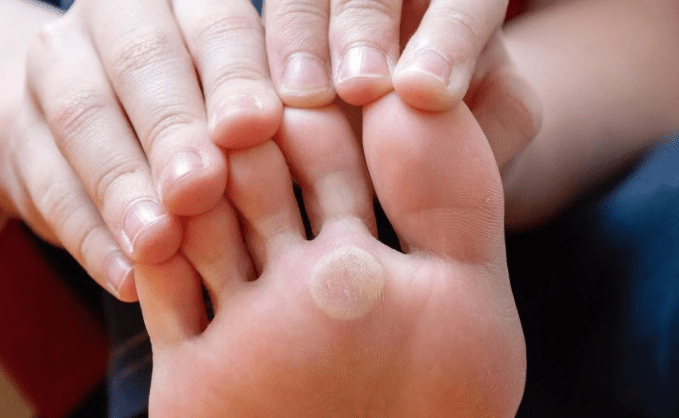
3. Baking Soda Paste
Baking soda exfoliates dead skin and balances pH, softening calluses and reducing irritation, as noted in skincare communities.
How to Use:
- Mix 1 tbsp baking soda with 1 tsp water to form a paste.
- Apply to corns or calluses, cover with a bandage, and leave overnight.
- Rinse and moisturize in the morning.
Frequency: Use 2-3 times weekly.
4. Lemon Juice Application
Lemon’s citric acid breaks down hardened skin and promotes healing, making it ideal for softening corns.
How to Use:
- Soak a cotton ball in fresh lemon juice.
- Apply to the corn, secure with a bandage, and leave for 2-3 hours.
- Rinse and file gently.
Frequency: Use daily for up to a week.
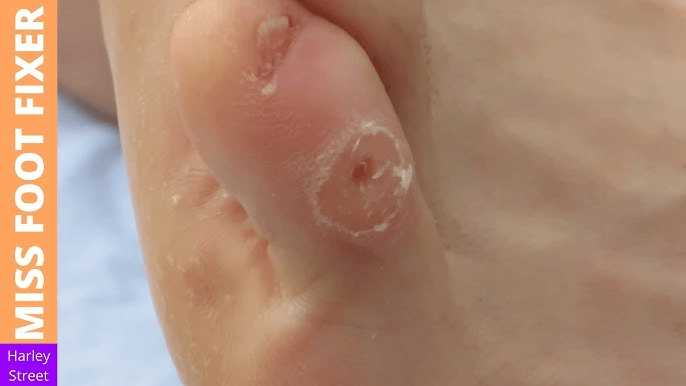
5. Aloe Vera Gel
Aloe vera’s soothing and moisturizing properties reduce inflammation and soften calluses, as supported by a 2019 study in Dermatologic Therapy.
How to Use:
- Apply fresh aloe vera gel to the affected area.
- Massage gently and leave on for 30 minutes.
- Rinse and apply a moisturizer.
Frequency: Use daily for soft, smooth skin.
6. Castor Oil Massage
Castor oil hydrates and softens tough skin, making it easier to remove calluses over time.
How to Use:
- Massage 1 tsp castor oil into the affected area before bed.
- Cover with a bandage or socks.
- Rinse in the morning and file gently.
Frequency: Use nightly for 5-7 days.
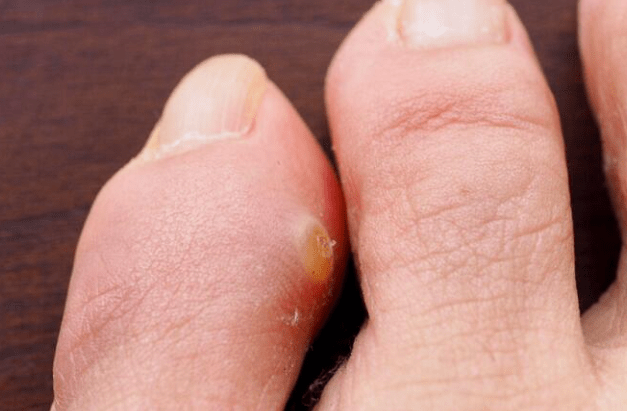
7. Chamomile Tea Soak
Chamomile’s anti-inflammatory properties soothe pain and soften skin, as noted in traditional remedies.
How to Use:
- Brew 2 chamomile tea bags in 1 gallon warm water.
- Soak feet for 15-20 minutes, then scrub with a pumice stone.
- Moisturize afterward.
Frequency: Use 2 times weekly.
8. Onion Slice Treatment
Onion’s sulfur compounds and enzymes soften corns and reduce inflammation, as used in folk remedies.
How to Use:
- Soak a thin onion slice in vinegar for 1 hour.
- Secure it over the corn with a bandage overnight.
- Rinse and file in the morning.
Frequency: Use daily for 3-4 days.
9. Tea Tree Oil Application
Tea tree oil’s antimicrobial properties prevent infection and soften calluses, as noted in a 2020 study in Journal of Cosmetic Dermatology.
How to Use:
- Dilute 2-3 drops tea tree oil with 1 tsp coconut oil.
- Apply to the corn or callus and cover with a bandage.
- Rinse after 2 hours.
Frequency: Use daily for up to a week.
10. Pineapple Peel Compress
Pineapple contains enzymes like bromelain that break down dead skin, softening corns effectively.
How to Use:
- Place a small piece of fresh pineapple peel over the corn.
- Secure with a bandage and leave overnight.
- Rinse and file gently.
Frequency: Use 2-3 times weekly.
11. Oatmeal Scrub
Oatmeal exfoliates and soothes, reducing callus thickness and relieving discomfort.
How to Use:
- Mix 2 tbsp ground oatmeal with 1 tbsp water to form a paste.
- Scrub gently over calluses for 1-2 minutes.
- Rinse and moisturize.
Frequency: Use 1-2 times weekly.
12. Coconut Oil Moisturizer
Coconut oil hydrates and softens skin, preventing further hardening of calluses.
How to Use:
- Massage 1 tbsp coconut oil into feet after soaking.
- Wear socks to lock in moisture overnight.
- Rinse in the morning.
Frequency: Use daily for prevention.
13. Garlic Paste
Garlic’s antimicrobial and softening properties help reduce corns, as used in traditional remedies.
How to Use:
- Crush 1 garlic clove and mix with 1 tsp olive oil.
- Apply to the corn, cover with a bandage, and leave for 2 hours.
- Rinse and file gently.
Frequency: Use daily for 3-5 days.
14. Aspirin Paste
Aspirin’s salicylic acid softens tough skin, making it easier to remove corns, as noted in dermatological practices.
How to Use:
- Crush 2-3 aspirin tablets and mix with 1 tsp water.
- Apply to the corn, cover, and leave for 20 minutes.
- Rinse and file gently.
Frequency: Use once daily for 3 days.
| Remedy | Key Ingredient | Benefit |
|---|---|---|
| Epsom Salt | Magnesium sulfate | Softens skin, reduces inflammation |
| Apple Cider Vinegar | Acetic acid | Softens, fights bacteria |
| Baking Soda | Sodium bicarbonate | Exfoliates, balances pH |
| Lemon Juice | Citric acid | Softens, promotes healing |
| Aloe Vera | Polysaccharides | Soothes, hydrates |
| Castor Oil | Fatty acids | Hydrates, softens |
| Chamomile | Anti-inflammatory compounds | Soothes, softens |
How to Apply These Remedies Safely
Follow these guidelines to ensure safe and effective results:
Preparation Tips
- Clean First: Wash feet with mild soap and water before applying remedies.
- Use a Pumice Stone: Gently file corns or calluses after soaking to remove softened skin.
- Moisturize Always: Apply a thick cream or oil post-treatment to prevent dryness.
Case Study: Maria’s Foot Transformation
Maria, a 42-year-old nurse, suffered from painful calluses due to long hours on her feet. She tried an Epsom salt soak followed by coconut oil massage nightly for a week. By day five, her calluses softened significantly, and pain decreased. After two weeks, her feet were smooth and comfortable. Maria’s success shows how consistent use of simple remedies can yield impressive results.
Lifestyle Tips to Prevent Corns and Calluses
To keep your feet smooth and prevent recurrence, adopt these habits:
- Wear Proper Footwear: Choose shoes with a wide toe box and good arch support.
- Moisturize Daily: Use a thick cream to keep skin soft and prevent hardening.
- Avoid Barefoot Walking: Protect feet from rough surfaces to reduce friction.
- Use Cushioning Pads: Place pads in shoes to relieve pressure on high-risk areas.
- Maintain Foot Hygiene: Wash and dry feet daily to prevent infections.
Safety Precautions
While these remedies are generally safe, take these precautions:
- Patch Test: Test remedies on a small skin area to check for allergies or irritation.
- Avoid Open Wounds: Do not apply to broken skin or infected corns.
- Limit Use: Avoid overuse to prevent skin irritation or thinning.
- Consult a Doctor: Seek medical advice for painful, inflamed, or persistent corns/calluses.
- Diabetes Caution: If you have diabetes, consult a podiatrist, as foot issues can lead to complications.
Common Questions About Corns and Calluses
Below, we address common concerns in an accordion-style format for clarity.
Can these remedies remove corns permanently?
They can remove existing corns, but prevention depends on addressing causes like tight shoes.
How long until I see results?
Most remedies show improvement in 3-7 days with consistent use, though results vary.
Are these safe for sensitive skin?
Yes, if diluted and patch-tested. Stop if irritation occurs and consult a dermatologist.
Can I use multiple remedies at once?
Stick to one remedy at a time to avoid irritation. Alternate if needed, with medical advice.
When should I see a doctor?
Seek care for painful, inflamed, or persistent corns, or if you have diabetes or circulation issues.
Disclaimer: This content is for informational purposes only and does not replace professional medical advice. Consult a healthcare provider or podiatrist before using these remedies, especially if you have medical conditions or persistent symptoms.




